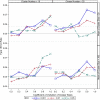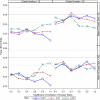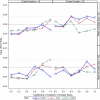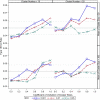Small sample performance of bias-corrected sandwich estimators for cluster-randomized trials with binary outcomes
- PMID: 25345738
- PMCID: PMC4268228
- DOI: 10.1002/sim.6344
Small sample performance of bias-corrected sandwich estimators for cluster-randomized trials with binary outcomes
Abstract
The sandwich estimator in generalized estimating equations (GEE) approach underestimates the true variance in small samples and consequently results in inflated type I error rates in hypothesis testing. This fact limits the application of the GEE in cluster-randomized trials (CRTs) with few clusters. Under various CRT scenarios with correlated binary outcomes, we evaluate the small sample properties of the GEE Wald tests using bias-corrected sandwich estimators. Our results suggest that the GEE Wald z-test should be avoided in the analyses of CRTs with few clusters even when bias-corrected sandwich estimators are used. With t-distribution approximation, the Kauermann and Carroll (KC)-correction can keep the test size to nominal levels even when the number of clusters is as low as 10 and is robust to the moderate variation of the cluster sizes. However, in cases with large variations in cluster sizes, the Fay and Graubard (FG)-correction should be used instead. Furthermore, we derive a formula to calculate the power and minimum total number of clusters one needs using the t-test and KC-correction for the CRTs with binary outcomes. The power levels as predicted by the proposed formula agree well with the empirical powers from the simulations. The proposed methods are illustrated using real CRT data. We conclude that with appropriate control of type I error rates under small sample sizes, we recommend the use of GEE approach in CRTs with binary outcomes because of fewer assumptions and robustness to the misspecification of the covariance structure.
Keywords: correlated data; generalized estimating equations (GEE); power; sample size; type I error rates.
Copyright © 2014 John Wiley & Sons, Ltd.
Figures





Similar articles
-
Comparing denominator degrees of freedom approximations for the generalized linear mixed model in analyzing binary outcome in small sample cluster-randomized trials.BMC Med Res Methodol. 2015 Apr 23;15:38. doi: 10.1186/s12874-015-0026-x. BMC Med Res Methodol. 2015. PMID: 25899170 Free PMC article.
-
Relative efficiency of equal versus unequal cluster sizes in cluster randomized trials with a small number of clusters.J Biopharm Stat. 2021 Mar;31(2):191-206. doi: 10.1080/10543406.2020.1814795. Epub 2020 Sep 24. J Biopharm Stat. 2021. PMID: 32970522 Free PMC article.
-
Sample size calculation in three-level cluster randomized trials using generalized estimating equation models.Stat Med. 2020 Oct 30;39(24):3347-3372. doi: 10.1002/sim.8670. Epub 2020 Jul 28. Stat Med. 2020. PMID: 32720717 Free PMC article.
-
Generalized estimating equations in cluster randomized trials with a small number of clusters: Review of practice and simulation study.Clin Trials. 2016 Aug;13(4):445-9. doi: 10.1177/1740774516643498. Epub 2016 Apr 19. Clin Trials. 2016. PMID: 27094487 Review.
-
A comparison of bias-adjusted generalized estimating equations for sparse binary data in small-sample longitudinal studies.Stat Med. 2023 Jul 10;42(15):2711-2727. doi: 10.1002/sim.9744. Epub 2023 Apr 16. Stat Med. 2023. PMID: 37062288 Review.
Cited by
-
Family-based intervention to prevent childhood obesity among school-age children of low socioeconomic status: study protocol of the FIVALIN project.BMC Pediatr. 2021 May 21;21(1):246. doi: 10.1186/s12887-021-02697-x. BMC Pediatr. 2021. PMID: 34020614 Free PMC article.
-
Effect of a community-based childhood obesity intervention program on changes in anthropometric variables, incidence of obesity, and lifestyle choices in Spanish children aged 8 to 10 years.Eur J Pediatr. 2018 Oct;177(10):1531-1539. doi: 10.1007/s00431-018-3207-x. Epub 2018 Jul 19. Eur J Pediatr. 2018. PMID: 30027297 Clinical Trial.
-
Overdispersion models for correlated multinomial data: Applications to blinding assessment.Stat Med. 2019 Nov 10;38(25):4963-4976. doi: 10.1002/sim.8344. Epub 2019 Aug 28. Stat Med. 2019. PMID: 31460677 Free PMC article.
-
Does implementation of office based addiction treatment by a nurse care manager increase the duration of OUD treatment in primary care? A secondary analysis of the PROUD randomized control trial.Drug Alcohol Depend. 2024 Dec 1;265:112497. doi: 10.1016/j.drugalcdep.2024.112497. Epub 2024 Nov 10. Drug Alcohol Depend. 2024. PMID: 39550823 Clinical Trial.
-
Awareness with paralysis and symptoms of post-traumatic stress disorder among mechanically ventilated emergency department survivors (ED-AWARENESS-2 Trial): study protocol for a pragmatic, multicenter, stepped wedge cluster randomized trial.Trials. 2023 Nov 25;24(1):753. doi: 10.1186/s13063-023-07764-5. Trials. 2023. PMID: 38001507 Free PMC article.
References
-
- Campbell MJ, Donner A, Klar N. Developments in cluster randomized trials and Statistics in Medicine. Stat Med. 2007;26:2–19. - PubMed
-
- Murray DM. Design and Analysis of Group-Randomized Trials. Oxford University Press Inc; New York, NY: 1998.
-
- Feng ZD, Diehr P, Peterson A, McLerran D. Selected statistical issues in group randomized trials. Annual Review of Public Health. 2001;22:167–187. - PubMed
-
- Turner RM, Omar RZ, Thompson SG. Bayesian methods of analysis for cluster randomized trials with binary outcome data. Stat Med. 2001;20:453–472. - PubMed
Publication types
MeSH terms
Grants and funding
LinkOut - more resources
Full Text Sources
Other Literature Sources
Research Materials
